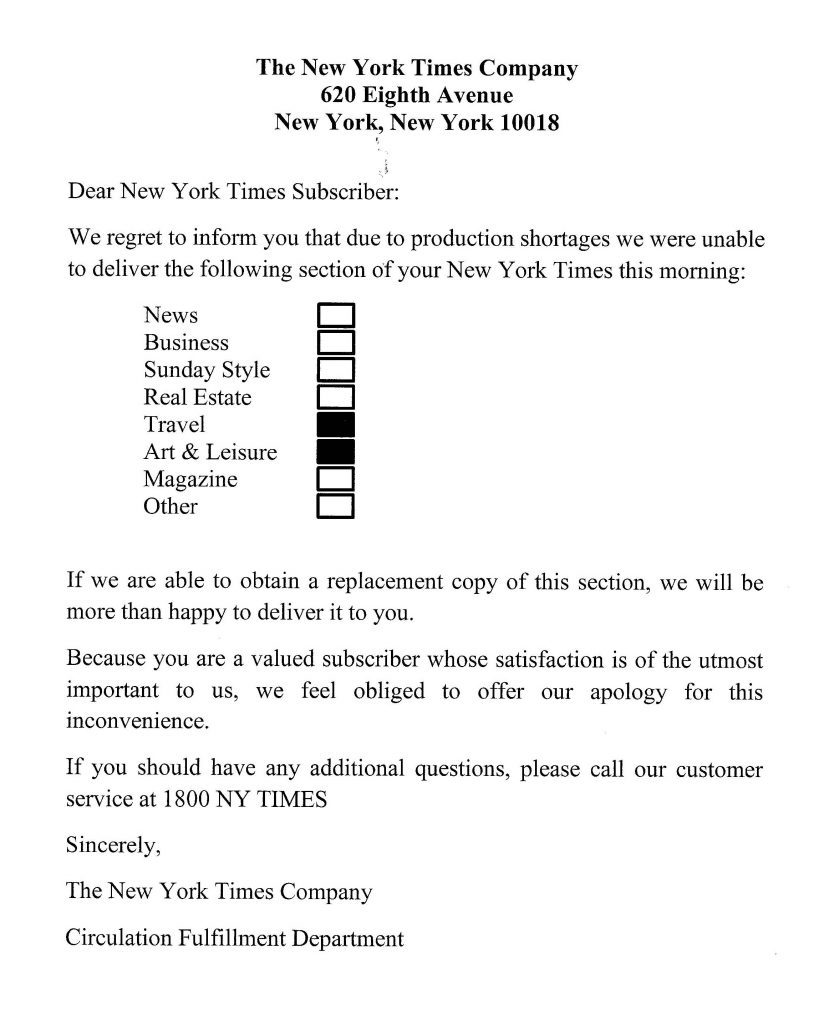If an apology is observably insincere, what’s the point? Politicians, celebrities, and athletes are often taken to task for pro forma or grudging apologies that don’t express true remorse, take responsibility, show recognition of the hurt or damage caused, or commit to doing better in the future.
And when the recipient notices that the “apology” contains “weasel words” — language that’s intentionally ambiguous or misleading — the “apology” backfires — creating its own offense, or adding insult to injury.
Exhibit A is the New York Times that was delivered to my house last Sunday with this notice:

What’s Fit to Print?
Initially, I thought the letter had been translated from English into some other language and then translated back again. Then I thought, oh, boy, do they ever need an editor!
Granted, the signatory “Circulation Fulfillment Department” is really just a local delivery service, rather than actual Times employees, but still! As someone who prefers the printed version of the New York Times over the digital facsimile — because, among other reasons, the print version exposes me to subjects I wouldn’t normally choose to read about — I also want the language in official communications to make sense.
Let me parse their letter:
If we are able to obtain a replacement copy of this section, we will be more than happy to deliver it to you.
What’s with this “more than happy” business? Just “happy” or “glad” is sufficient. Plus, “more than happy” doesn’t say anything about committing to an actual delivery. Here’s a more straightforward version: “If we can obtain a replacement copy of this section, we will deliver it to you promptly.” Because that’s when I want it: promptly, if not immediately.
Because you are a valued subscriber…
Oh, yeah? You sure don’t act like it!
…whose satisfaction is of the utmost important [sic] to us…
Yes, I can tell how important my satisfaction is by the way you periodically forget the Magazine, or seem to hydroplane the paper when it’s raining so it picks up as much water as possible, etc., or proofread this letter!
…we feel obliged to offer our apology…
You FEEL obliged? You ARE obliged — to deliver the paper, not to make formalistic, empty apologies!
And is this an offer to make an apology if I want one, or an actual apology? How about just saying, “We’re sorry”? And how about adding, “We’ll do better in the future,” or “We’ll take a courtesy discount off your bill”?
…for this inconvenience.
NOW I’m cranky. Yes, it certainly was inconvenient to have sections missing, but mistakes do happen. Instead of making me feel better, though, the Times’ bureaucratese makes me feel stupid: can I trust the paper itself if it permits such inane communication on its behalf?
The Upshot on Saying You’re Sorry
Please: When you issue apologies, sound like you’re actually regretful, say how you’ll fix it or make it up to the customer, and commit to doing better — that’s all that any reasonable customer ever expects. The weasel (a ferret-like animal, also known for deceit and treachery) should become an ermine (a related animal also known as a traditional adornment for royalty).
Onward and upward,
LK

